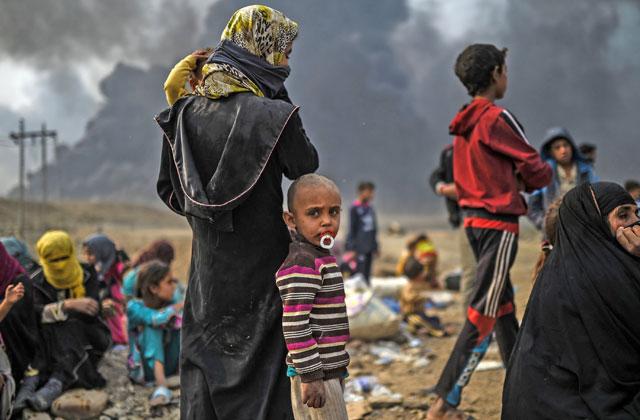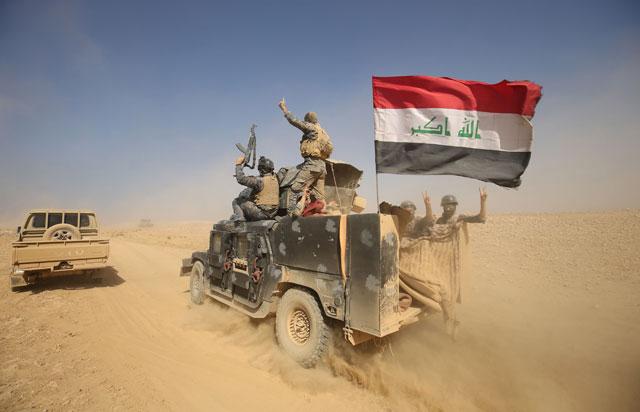You are here
Wave of strikes as Daesh puts up tough defence of Mosul
By AFP - Oct 24,2016 - Last updated at Oct 24,2016

Iraqi families, who were displaced by the ongoing operation by Iraqi forces against Daesh militants to retake the city of Mosul, are seen gathering in an area near Qayyarah on Monday (AFP photo)
QARAQOSH, Iraq — Iraqi forces advancing on Mosul faced stiff resistance Monday from the Daesh terror group despite an unprecedented wave of air strikes by the US-led coalition in support of the week-old offensive.
Federal forces and Kurdish peshmerga fighters gained ground in several areas, AFP correspondents on various fronts said, but the extremists were hitting back with shelling, sniper fire, suicide car bombs and booby traps.
Daesh has also attempted to draw attention away from losses around Mosul with attacks on Iraqi forces elsewhere in the country, the latest coming on Sunday near the Jordanian border.
Following a weekend visit to Iraq by US Defence Secretary Ashton Carter, American officials said the coalition was providing the most air support yet to the operation.
"One week into Mosul operation, all objectives met thus far, and more coalition air strikes than any other 7-day period of war against ISIL [Daesh]," Brett McGurk, the top US envoy to the 60-nation coalition, wrote on social media.
"There were 32 strikes with 1,776 munitions delivered" against Daesh targets between October 17 and 23, coalition spokesman Colonel John Dorrian told AFP.
He said those strikes had destroyed 136 Daesh fighting positions, 18 tunnels and 26 car bombs.
The offensive, launched on October 17, aims to retake towns and villages surrounding Mosul before elite troops breach the city and engage die-hard extremists in street-to-street fighting.
‘Good defences’
On the eastern side of Mosul, federal troops were battling Daesh on Monday in Qaraqosh, which used to be the largest Christian town in the country.
Army forces entered the town for the third day running but armoured convoys deployed around it were met with shelling from inside, an AFP correspondent reported.
Federal forces also scored gains on the southern front, where they have been making quick progress, taking one village after another as they work their way up the Tigris Valley.
On the northern front, Kurdish peshmerga forces were closing in on the Daesh-held town of Bashiqa.
Turkey, which has a base in the area, said Sunday it had provided artillery support following a request from the peshmerga.
The presence of Turkish troops on Iraqi soil is deeply unpopular in Baghdad and the Joint Operations Command on Monday vehemently denied any Turkish participation.
But AFP reporters near Bashiqa said artillery fire coming from the Turkish base had been sighted on several occasions since the start of operations a week ago.
While an increasingly pragmatic Daesh has tended in recent months to relinquish some of its positions to avoid taking too many casualties, US officials said the group was mounting a spirited defence of Mosul.
If Daesh loses Mosul in Iraq, only Raqqa in Syria will remain as the last major city under the extremists’ control in either country.
“They have made a very good job of preparing their defences around the city,” one US military official told reporters during Carter’s visit.
The coalition estimates the number of Daesh fighters defending Mosul — the city where Daesh supremo Abu Bakr Al Baghdadi proclaimed a “caliphate” two years ago — at 4,000 to 7,000.
Calm returns to Kirkuk
The coalition’s top commander, General Stephen Townsend, said Sunday he expected not all the extremists in Mosul would “fight to the death”.
“By targeting the mid-tier leaders, which our special operations forces and air force have done remarkably well, we have caused a lot of confusion” in Daesh ranks, he said.
“I think it’s going to pay off in the coming weeks.”
Seeking to distract attention, the militants have attempted to hit back with attacks elsewhere in Iraq, including in the remote western town of Rutba on Sunday.
They briefly seized the mayor’s office, captured and executed at least five people — civilians and policemen — and still controlled two neighbourhoods on Monday, army commanders said.
On Friday, Daesh sleeper cells in Kirkuk joined up with gunmen infiltrating the northern city to launch a brazen raid that saw the extermists attack several government buildings.
The attack sparked clashes that lasted three days as security forces imposed a curfew to hunt down attackers holed up in several buildings across the city.
The provincial governor, Najmeddin Karim, told AFP on Monday that the attack was over and life was returning to normal.
He said more than 74 Daesh militants were killed in the violence, which also left at least 46 other people dead, most of them members of the security forces.
Human Rights Watch, meanwhile, called for an investigation into an apparent air strike that killed 15 women gathered in a mosque in Daquq, south of Kirkuk, on Friday.
Russia has pointed a finger at the US-led coalition, which denied carrying out the air strike.
Related Articles
Erbil, Iraq — Iraqi forces battled Sunday through booby-traps, sniper fire and suicide car bombs to tighten the noose around Mosul, while al
QAYYARAH, Iraq — Extremist leaders are fleeing Mosul, a top US general in the coalition battling the Daesh terror group said Wednesday as Ir
STUTTGART, Germany — Daesh militants killed a US serviceman in northern Iraq on Tuesday after blasting through Kurdish defences and overrunn


















